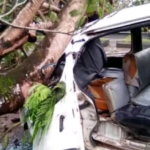In the heart of Oyo State, an institution, the Federal Polytechnic, Ayede, is making impressive waves in the technical education sector. The polytechnic, established in 2021, has become a model for innovation and excellence. Its pioneer rector, Dr. Taofeek Abdul-Hameed, speaks with RASAQ IBRAHIM, about the institution’s achievements and vision for the future.
From the scratch into a citadel of learning
The Federal Polytechnic, Ayede, Oyo State is one of the six polytechnics established by former President Muhammadu Buhari in 2021 to address demand for technical education and meeting the needs of the society in terms of entrepreneurship and skills development.
Since its establishment, the young ivory tower has grown in leaps and bounds as a citadel of learning and excellence. When the institution made its debut into the Nigeria’s education space with the aim of transforming Nigeria’s technical education, only very few people saw hope in its horizon.
But, the polytechnic within four years has proved the pessimists wrong and has courageously trodden on an uncharted path through its exploits in academic excellence, innovation, scholarships and researches.
From humble beginnings, the polytechnic has made significant strides in research, capacity building, and entrepreneurship development. Despite facing numerous hydra-headed challenges, including lack of infrastructure, offices and salaries for months, the polytechnic persevered and is now beacon of hope for students seeking skills acquisition and vocational training.
With a focus on entrepreneurship development and skills acquisition as well as artificial intelligence, its pioneer rector, Dr. Taofeek Abdul-Hameed, said the institution is poised to produce innovative graduates, who will make positive impact in the country. The polytechnic’s emphasis on practical skill and hands-on training, he said, is a departure from the traditional theoretical approach to education.
Dr. Abdul-Hameed described the journey as challenging. But he thanked God for the progress made so far. He said despite being a newly established institution, the polytechnic has made significant strides in manpower, infrastructure development and student admission, surpassing its contemporaries.
How it survived numerous challenges
The rector explained that the institution faced numerous challenges.
“The early days were eventful and challenging. We started with nothing, no infrastructure, no offices, and no salaries for months. But through dedication and hard work, we overcame these obstacles and secured temporary campus site as well as administrative building, and recruited staff,” Abdul-hammed recalled.
The breaking of barriers in several areas
The polytechnic has broken barriers in several areas. It commenced academic activities in July 2022 with four approved programmes, despite being a new ivory tower. The rector expressed confidence that the other courses will be accredited soon.
He said: “We invited the National Board for Technical Education (NBTE), which is our supervisory and monitoring agency and we were bold enough to say we wanted to commence about 12 programmes at the same time, despite all the challenges. But the NBTE, after considering everything, including the challenges, gave us four to start with.
“They approved Computer Science, Computer Engineering, Statistics and Science Laboratory Technology. This encouraged us the more because our peers – the other five – were given only two courses to start with. One was even given only one course. “Eventually, we commenced academic activities in July 2022. From there, we started making progress and we have been telling our staff that the polytechnic is not an institution where you just acquire a certificate. We know that there are no jobs out there and so, we don’t want our students to be seeking for employment after graduation.
“The institution gives premium to entrepreneurship development and we are making tremendous progress in that regard to the extent that one of our students, even before graduation, was offered employment because of what he learnt here,” he added.
The rector noted that the polytechnic is committed to excellence in all its endeavours, saying it has made significant strides in research and capacity building.
He said: “We are just three years old – when we count from when we actually took-off in 2022 – and we already have 32 beneficiaries, who are into various fields of research.
“Even some institutions which are older than Ayede do not have this number. That shows that we are encouraging our staff to embark on research; research that would lead to the development of the society. When it comes to hands-on skills, we are ready.
“Currently, we have 21 who are beneficiaries of TETFund sponsorship for international conferences; and we also have 90 on local conferences. The management encourages the staff on conferences to cross-fertilise ideas for development.”
The polytechnic’s student enrollment has also seen significant growth, with 1,200 students currently enrolled, making it the institution with the highest number of students among the six polytechnics established in 2021. Abdul-Hammed attributed this growth to the institution’s focus on skill acquisition, vocational training, innovation and entrepreneurship development.
Call for parity between Bachelor’s degree, Higher National Diploma
Emphasising the importance of skills acquisition and vocations in advanced countries as examples, Dr. Abdul-Hammed advocated for parity between Bachelor’s degree and Higher National Diploma holders, arguing that paper qualifications should not be the sole measure of a person’s worth.
“In advanced countries, skills acquisition and vocations are encouraged. If you are talking about China today, it is because they give a premium to entrepreneurship development through skill acquisition and vocational development.
“I attended over three universities to get my degrees, and I have been in the polytechnic sector for over 30 years. So, I can make comparisons. If you look at it, it is because we lay so much emphasis on paper qualifications that is why we are not progressing the way we should as a country. If and only if government can encourage skills and vocations, we will move faster. Our slogan at NBTE is ‘Skills rather than degrees’ because acquiring skills is the in thing. No nation can develop without promoting skills acquisition,” he said.
Strategic partnerships with stakeholders
The polytechnic’s presence has positively impacted the host community, with development and economic growth evident in the temporary campus and surrounding areas. The institution has also established strategic partnerships with various stakeholders, including industries and government agencies, to provide students with practical training and job opportunities.
“Our relationship with the community is quite cordial. Yes, you cannot satisfy everybody, but we are in a very good standing with the community. For instance, in the first and second employment exercises that we did, we were given 150 to employ and 32 per cent of those employed are from Oyo State. Twenty-one percent from Osun State. The House of Representatives Committee on Federal Character mandated us to reflect the federal character principle in the next employment. So, we are looking at the North West, North East, South-South, the South-East and all of that.
“We are yet to move to our permanent site at Ayede, but at our temporary site, we have a very good rapport with the Iresa Pupa community. I commend the Soun of Ogbomosoland, Oba Ghandi Afolabi Olaoye, for his encouragement and support. The Aresa of Iresa Pupa has been so kind and supportive likewise the Alajaawa of Ajaawa because Ayede has no king yet,” the rector said.
Abdul-Hammed attributed the institution’s exploits to the support of President Bola Tinubu, Minister of Education, Dr. Tunji Alausa, and TETFund, saying their efforts in providing necessary resources have been significantly instrumental in the institution’s growth.










